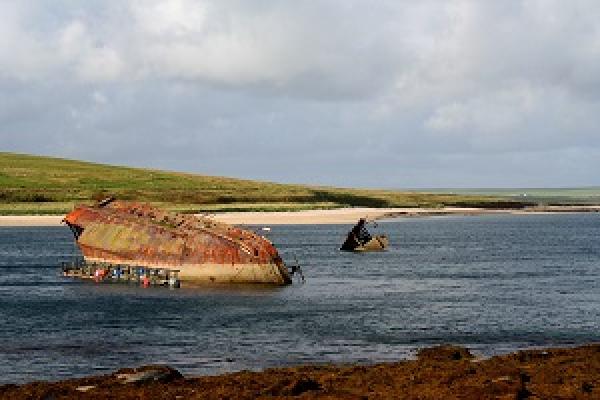
Danielle Southey
Published: January 28, 2019

Warner v Scapa Flow Charters (Scotland)1
In considering an appeal from the Scottish courts on the application of the Athens Convention time bar, the Supreme Court has examined issues of interpretation of international conventions.
Background
A claim in negligence was brought by a widow, on behalf of herself and her son, against Scapa Flow Charters (“SFC”) following the death of her husband whilst on board a dive boat operated by SFC.
The parties agreed that the Athens Convention, which provides a liability regime for passenger death, personal injury and property damage claims that arise on seagoing vessels, should apply to the claim.
The claim against SFC was lodged in May 2015, two years and 10 months after the incident. SFC defended the claim on the grounds that it was time barred under Article 16 (1) of the Athens Convention which provides for a two year time bar running from the date of disembarkation (or when disembarkation would have taken place). Article 16 (3) sets out a criteria for extension but with a longstop time bar of three years. More particularly, Article 16 sets out:
1. Any action for damages arising out of the death of or personal injury to a passenger or for the loss of or damage to luggage shall be time-barred after a period of two years.
……
3. The law of the court seized of the case shall govern the grounds of suspension and interruption of limitation periods, but in no case shall an action under this Convention be brought after the expiration of a period of three years from the date of disembarkation of the passenger or from the date when disembarkation should have taken place, whichever is later.
SFC’s time bar defence succeeded at the first instance. On appeal, the Scottish courts upheld the decision in respect of the widow’s claim but reversed it in respect of the claim on behalf of her son who had been less than a year old at the time of the accident.
SFC appealed to the Supreme Court of the United Kingdom (as the highest court of appeal on certain civil claims in Scotland) on the question of whether the son’s claim was time barred.
Supreme Court Judgment
The Supreme Court dismissed SFC’s appeal and agreed that the son’s claim was not time barred.
Lord Hodge opened his judgment by setting out the underlying principle that the claim should be subject to the two year time bar of Article 16 (1) unless it was extended in accordance with 16 (3) which provides that the law of the court seized (Scotland in this instance) shall govern the grounds of suspension and interruption of the limitation period. Lord Hodge made clear that if extended by the law of the court seized, the three year ‘longstop’ limitation would apply and domestic law could not extend the limitation beyond the three years.
Turning to the laws of the ‘court seized’, the claimant relied on the Prescription and Limitation (Scotland) Act 1973 which provides that where a deceased’s relative brings a claim, any time shall ‘be disregarded in the computation of the [limitation] period’ whilst the relative is under 16 years old.
SFC argued that because Scottish law ‘postponed’ the limitation period, as opposed to ‘suspending’ or ‘interrupting’ it, Article 16 (3) of the Athens Convention did not apply. SFC advanced two arguments to support this theory.
First, they said the natural meaning of the words ‘suspension’ and ‘interruption’ applied only when a period was already underway. Under the Prescriptions and Limitation (Scotland) Act, time had not started to run, instead the start was postponed.
Lord Hodge rejected this argument, concluding that the word ‘suspension’ was sufficiently broad to include rules postponing the start of a limitation period.
SFC’s second contention was that the words ‘suspension’ and ‘interruption’ had particular and technical meanings derived from certain civil law systems, including Spain and France. ‘Suspension’, SFC said, occurs when an incident pauses a limitation period whilst an ‘interruption’ has the effect of restarting the limitation period afresh.
Lord Hodge rejected this argument, stating:
“It is not appropriate to look to the domestic law of certain civil law systems for a technical meaning of the words in an international convention which was designed to be operated in many common law systems as well.”
Furthermore, Lord Hodge concluded there was in fact no uniformity in the use of the word ‘suspension’ amongst other civil law systems.
English Law - Limitation Act 1980
This case will not immediately alter the position under English law: the two year time bar under Article 16 (1) of the Athens convention would still apply.
The English Court of Appeal considered a similar issue in the case of Higham v Stena Sealink Ltd2 and decided that Section 33 of the Limitation Act could not be relied on to extend time under Article 16 (3). Section 33 of the Limitation Act gives discretion to the English courts to proceed with a claim, notwithstanding a limitation period, if they consider it equitable to do so. In Warner v Scapa Flow Charters, Lord Hodge said he agreed with the Court of Appeal’s view that Section 33 should not be seen as a ground of ‘suspension’ or ‘interruption’ as required by Article 16 (3) of the Athens Convention.
Nevertheless, whilst Section 33 may not have given rise to an Article 16 (3) extension, it is possible that other domestic provisions will give rise to an extended time limit (such as the Limitation Act’s provisions for claimants with disabilities), particularly if the English courts follow the broad interpretation principles discussed in Warner v Scapa Flow Charters.
Statutory Interpretation
Lord Hodge’s judgment provides a useful summary of how the courts look at international conventions. The uniformity with which different courts interpret international conventions is crucial to shipping given the frequency with which such conventions are used – the Hague Visby Rules being one such example.
The Vienna Convention on the Law of Treaties of 1969 is a starting point when considering the approach to convention interpretation. Articles 31 and 32 of that Convention state:
31. (1) A treaty shall be interpreted in good faith in accordance with the ordinary meaning to be given to the terms of the treaty in their context and in the light of its object and purpose...
32. Recourse may be had to supplementary means of interpretation, including the preparatory work of the treaty and the circumstances of its conclusion, in order to confirm the meaning resulting from the application of article 31, …. to determine the meaning when the interpretation according to article 31: (a) leaves the meaning ambiguous or obscure; or (b) leads to a result which is manifestly absurd or unreasonable.'
The Warner v Scapa Flow Charters judgment cites and expands on these key principles. Lord Hodge points to travaux preparatoires (the body of documents recording the preparatory work and discussions in preparation of a convention), case law of foreign courts and the writings of jurists as appropriate aids of interpretation.
The importance of travaux preparatoires has, in the past, been somewhat uncertain - indeed examination of the Athens Convention’s travaux preparatoires did little to inform Lord Hodge’s judgment in the case of Warner v Scapa Flow Charters. However, in Fothergill v Monarch Airlines Ltd3 it was established that reference to travaux preparatoires could be appropriate if there were ambiguities to resolve. Whilst considering an ambiguity in the Warsaw Convention following damage to an air passenger’s baggage, Lord Wilberforce said in that case that two conditions had to be met to allow reliance on travaux preparatoires – first, the material relied upon should be public and accessible and second, the travaux preparatoires had to be indisputably ‘on point’.
That view was affirmed in the case of The Giannis NK4, where the House of Lords considered the English court’s interpretation of The Hague Rules. The House of Lords held that travaux preparatoires could only be determinative if it ‘clearly and indisputably point to a definitive legal intention… Only a bull’s eye counts. Nothing less will do.’ Nevertheless, travaux preparatoires has proved useful, such as in the recently reported case of The Aqasia where the travaux preparatoires for the Hague Rules helped the Court of Appeal confirm the interpretation of a unit
Conclusion
The Supreme Court judgment in Warner v Scapa Flow Charters provides useful guidance not only on the time bar issues surrounding Athens Convention claims, but also on how domestic courts might look at international conventions. The judgment suggests that a broad interpretation be given to such international conventions and that courts should give consideration to the overall purpose of a convention and place less emphasis on technical analysis and domestic approaches to statutory interpretation.
1 Warner v Scapa Flow Charterers (Scotland) [2018] UCSC 52
2Higham v Stena Sealink Ltd [1996]2 Lloyd’s Rep. 26
3Fothergill v Monarch Airlines Ltd [1981] AC 251
4“Giannis NK” Effort Shipping v Linden Management S.A. and Others [1998] 1 Lloyd’s Rep. 337


